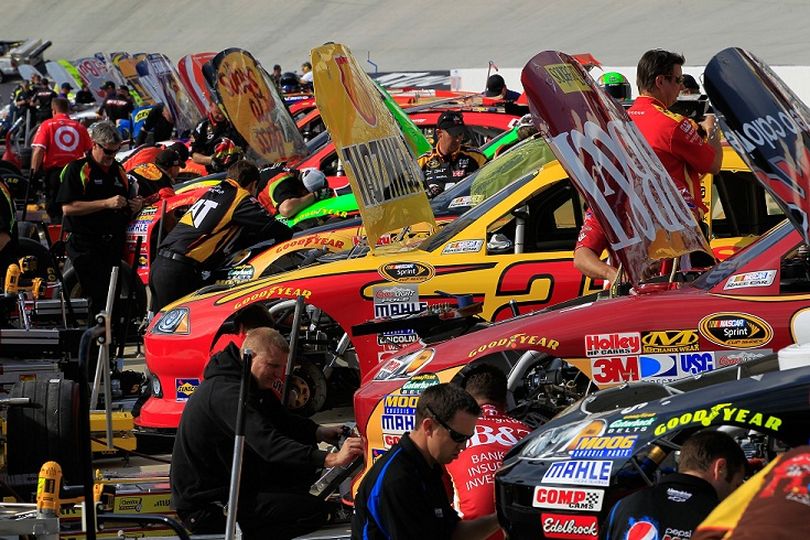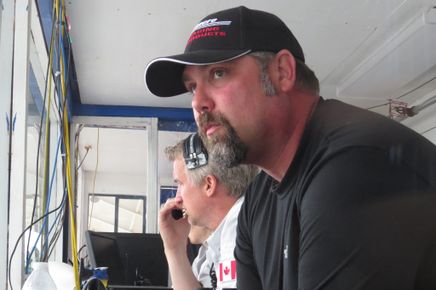Racing Provides Respite, Remedy

Our world is in the midst of some very interesting times. Having the chance to catch a good race is a bit of a respite for many according to Cathy Elliott.
Guest Column by Cathy Elliott
When you live in an area with a high concentration of NASCAR fans, and you are curious by nature about the opinions of others, the end result is that you tend to become somewhat of a habitual eavesdropper. (In my own defense, I have to point out that those tables at Starbucks are awfully close together.)
When you live in an area with a high concentration of NASCAR fans, and you are curious by nature about the opinions of others, the end result is that you tend to become somewhat of a habitual eavesdropper. (In my own defense, I have to point out that those tables at Starbucks are awfully close together.)
People admit how they really feel when they think no one else is listening, and I have picked up some pretty salient observations over the years, ranging from the ‘real story’ about Lindsay Lohan and the necklace to which bridal hopeful “The Bachelor” Brad Womack should have proposed to after getting to know them in a meaningful way for a whopping six weeks.
Granted, these don’t qualify as the deepest of philosophical discussions, so this next piece of purloined dialogue stood out a bit.
Person 1: “Things are so bad in the world right now that I don’t even feel right about watching the race this weekend.”
Person 2: “Seriously? It’s Bristol!”
I don’t know how you feel about it, but to my way of thinking, this is an argument in which both sides are absolutely right.
The 9.0-magnitude earthquake that hit Japan on March 11 was one of the largest ever recorded, killing thousands of people and sweeping away everything in its path. News footage of the ensuing tsunami created by the earthquake is simply terrifying. The devastation and the many years of cleanup required to recover from these disasters is unimaginable.
Then came the threat of a very real, and potentially very deadly, nuclear incident.
‘March Madness’ is a phrase that has become part of the American vernacular. We use it in reference to the post-season NCAA basketball tournament, and if you ask me, it can certainly apply to the race weekend at Bristol, which is like a NASCAR smoothie, where you toss a bunch of ingredients into a blender, crank it up, and see what happens. (That result is usually anything but smooth, by the way.)
But the madness in Japan in March 2011 is much grimmer. No matter how many times we watch the TV footage, or see the images on the Internet or in the newspaper, it’s nearly impossible to grasp how horrific these events have been for those who have experienced them.
The so-called ‘hot topics’ we have focused on lately become so pale in comparison they all but disappear. When faced with big-picture reality, does it really matter who wore the tackiest dress to the Academy Awards, or whether the new “American Idol” judges can ever replace Simon Cowell in the hearts of America?
Nope. Those issues and others like them are insignificant dots in the global picture, but that doesn’t make it wrong for us to be interested by them. Truth be told, they are a welcome distraction.
One of NASCAR Nation’s very finest attributes is that it cares. It cares about stock car racing fans, and it cares about the drivers who entertain us each week.
It also cares about others. On March 15, the General Motors Foundation – GM, of course, is NASCAR’s reigning championship auto manufacturer -- approved an immediate $500,000 contribution to the American Red Cross relief fund to help Japan.
Additionally, the American Red Cross (ARC) has announced an initial contribution of $10 million to the Japanese Red Cross Society to assist in its ongoing efforts to provide medical care and relief assistance to the people of Japan. The American Red Cross has a long-standing relationship with NASCAR. The NASCAR Foundation’s annual blood drive, held in conjunction with the ARC, mobilizes tracks, drivers, teams and sponsors to help meet the ongoing need for blood donations, and driver Greg Biffle has served as one of the ARC’s primary spokesmen.
You have probably heard this before, but it is a fact that the film industry was affected by World War II, in an unexpected manner; movie theater attendance rose dramatically. In the midst of worry, violence and suffering, people sought some means of escape, some small way to take their minds off their very big problems.
They found that avenue of escape in movie theaters. We can find it on the racetrack. Even Mary Poppins knew that a spoonful of sugar can’t cure what ails us, but it does help that bitter medicine go down, setting us firmly on the road to recovery.
So go ahead and pore over your NCAA tournament brackets, shake your head in bewilderment at Charlie Sheen, and by all means, tune in to the NASCAR races, at Bristol and everywhere else on the schedule. Temporary escapism into something so familiar and so much fun, far from being a guilty pleasure, is sometimes an absolute necessity.
For more information on how you can contribute to American Red Cross relief efforts, visit www.redcross.org.
